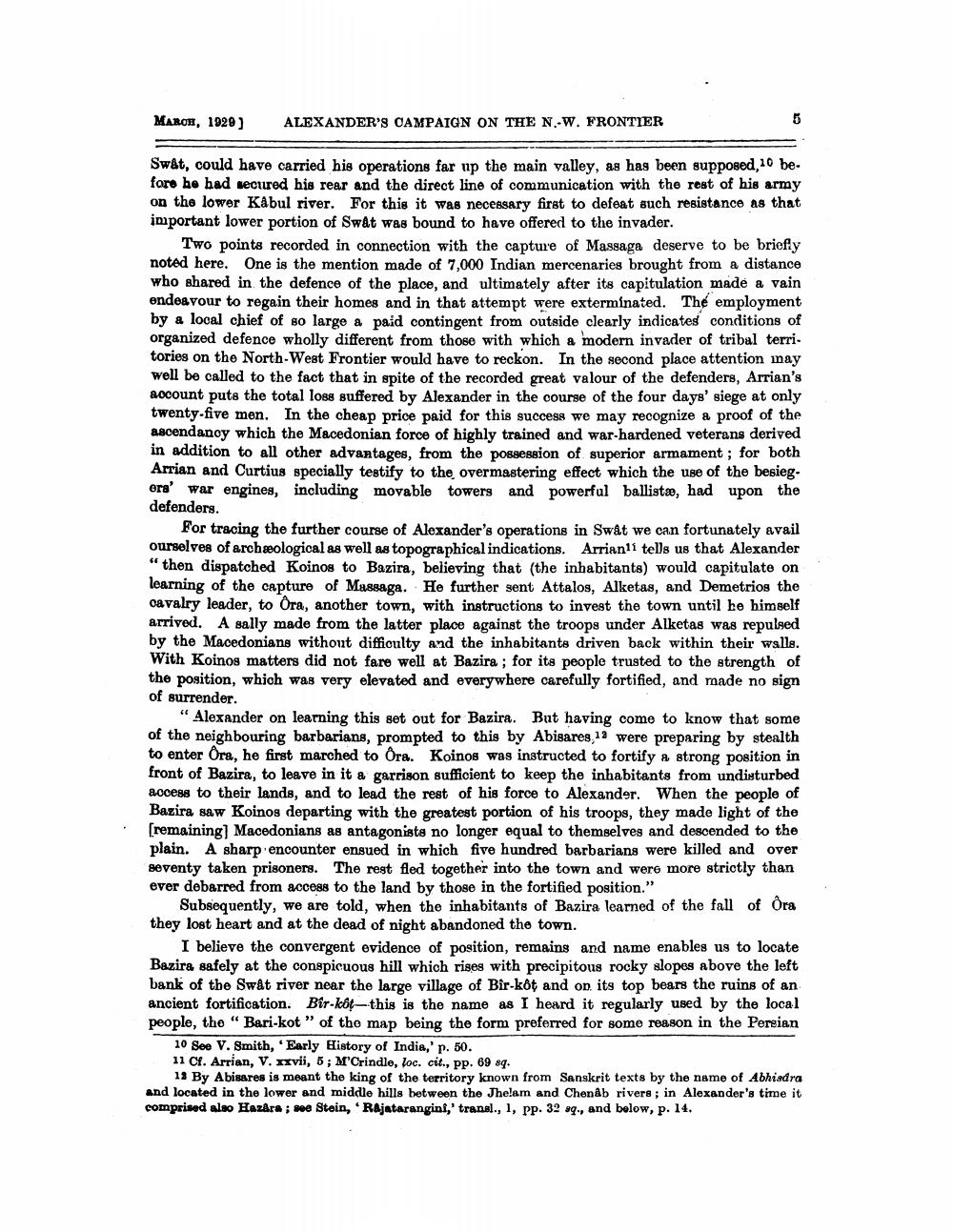________________
MAROH, 1929)
ALEXANDER'S CAMPAIGN ON THE N.-W. FRONTIER
Swat, could have carried his operations far up the main valley, as has been supposed, 10 be. fore he had secured his rear and the direct line of communication with the rest of his army on the lower Kabul river. For this it was necessary first to defeat such resistance as that important lower portion of Swat was bound to have offered to the invader.
Two points recorded in connection with the capture of Massaga deserve to be briefly noted here. One is the mention made of 7,000 Indian mercenaries brought from a distance who shared in the defence of the place, and ultimately after its capitulation made a vain endeavour to regain their homes and in that attempt were exterminated. The employment by a local chief of so large a paid contingent from outside clearly indicates conditions of organized defence wholly different from those with which a modern in vader of tribal territories on the North-West Frontier would have to reckon. In the second place attention inay well be called to the fact that in spite of the recorded great valour of the defenders, Arrian's account puts the total loss suffered by Alexander in the course of the four days' siege at only twenty-five men. In the cheap price paid for this success we may recognize a proof of the ascendanoy which the Macedonian force of highly trained and war-hardened veterans derived in addition to all other advantages, from the possession of superior armament; for both Arrian and Curtius specially testify to the overmastering effect which the use of the besieg. ora' war engines, including movable towers and powerful ballista, had upon the defenders.
For tracing the further course of Alexander's operations in Swat we can fortunately avail ourselves of archeological as well as topographical indications. Arrian11 tells us that Alexander "then dispatched Koinos to Bazira, believing that the inhabitants) would capitulate on learning of the capture of Massaga. He further sent Attalos, Alketas, and Demetrios the cavalry leader, to Ora, another town, with instructions to invest the town until he himself arrived. A sally made from the latter place against the troops under Alketas was repulsed by the Macedonians without difficulty and the inhabitants driven back within their walls. With Koinos matters did not fare well at Bazira; for its people trusted to the strength of the position, which was very elevated and everywhere carefully fortified, and made no sign of surrender.
" Alexander on learning this set out for Bazira. But having come to know that some of the neighbouring barbarians, prompted to this by Abisares, 12 were preparing by stealth to enter Ora, he first marched to Ora. Koinos was instructed to fortify a strong position in front of Bazira, to leave in it a garrison sufficient to keep the inhabitants from undisturbed access to their lands, and to lead the rest of his force to Alexander. When the people of Bazira saw Koinos departing with the greatest portion of his troops, they made light of the [remaining] Macedonians as antagonists no longer equal to themselves and descended to the plain. A sharp encounter ensued in which five hundred barbarians were killed and over seventy taken prisoners. The rest fled together into the town and were more strictly than ever debarred from access to the land by those in the fortified position."
Subsequently, we are told, when the inhabitants of Bazira learned of the fall of Ora they lost heart and at the dead of night abandoned the town.
I believe the convergent evidence of position, remains and name enables us to locate Bazira safely at the conspicuous hill which rises with precipitous rocky slopes above the left bank of the Swat river near the large village of Bir-kot and on its top bears the ruins of an ancient fortification. Bir-kót this is the name as I heard it regularly used by the local people, the “Bari-kot” of the map being the form preferred for some reason in the Persian
10 See V. Smith, Early History of India,' p. 50. 11 Cf. Arrian, V. xxvii, 5; M'Crindle, loc. cit., pp. 69 89.
13 By Abisares is meant the king of the territory known from Sanskrit texts by the name of Abhiadra and located in the lower and middle hills between the Jhe!am and Chenab rivers ; in Alexander's time it comprised also Hazara ; 20 Stein, Rajatarangini,'tranal., 1, pp. 32 sq., and below, p. 14.




